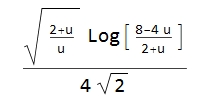Consider the following code:
Assuming[2 > u > 0 && 2 > x > 0, FullSimplify[Log[x]/Sqrt[4 - x^2] /. x -> 2 Sqrt[(2 - u)/(2 + u)]]]
The following output is returned:
(the TeX'd equivalent, screenshots for Mathematica output make me uneasy)
$$\frac{1}{8}\sqrt{2+\frac{4}{u}} \text{Log}\left[-4+\frac{16}{2+u} \right]$$
How can I force Together on the arguments?
i.e. I would like it to look something closer to this:
$$\frac{1}{8}\sqrt{\frac{4+2u}{u}} \text{Log}\left[\frac{8-4u}{2+u}\right]$$
FullSimplify, Together, Simplify, etc. don't change the output by any significant margin.


ExpandNumerator@*Together //@ %after evaluating your snippet. $\endgroup$